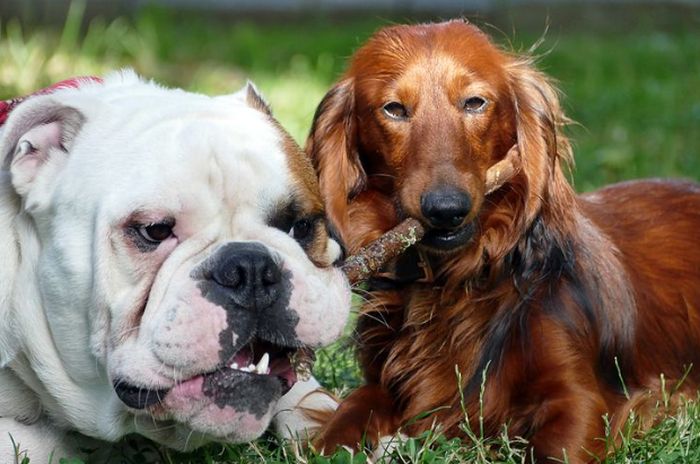
In a world where there are literally hundreds of different breeds of dog, choosing the right one for you can be tricky, even if you think you have an idea of the pooch you want to join the family.
Typically, people will go on looks alone. This is natural, as you want a dog that you find cute/attractive/suits you best, but just like making friends with a human, there is a personality behind each dog. This means that you need to do some research before settling on a certain type of dog.
Most dogs will have been bred to serve a purpose, and therefore, still have natural instincts, which can vary from hunting to guarding or herding, etc., depending on the breed. As allpets.com mention in their article that crossbred dogs tend to live longer on average than purebred dogs, typically by about a year.
There are some other important elements to factor in that can shape your dog’s character; one notably being the environment they were born and raised in when they were a puppy.
What breed of dog will best fit you and vice versa? Let’s take a look and find out…
Gundogs
This type of dog was originally bred for the role of finding and retrieving game. They are well-known for their tendency to have docile temperaments, which makes them a great option for families.
Because they have worked alongside people for a long time, they can offer lots of affection. Their intelligent and active nature means you will have to provide them with plenty of exercise and mental stimulation.
Common gundogs:
- Cocker Spaniel
- English Springer Spaniel
- Golden Retriever
- Labrador Retriever
- Weimaraner
Hounds
Hounds can regularly be referred to as “detached”. That isn’t to say that they aren’t keen on companionship, and they can, in fact, become rather mischievous when left at home alone, but they just typically tend not to demonstrate their affection to the level that some other breeds do.
They were originally bred to function in hunting and to work at a distance from their owners, and this means that they’re known for being independent and as such as harder to bond with, sometimes.
With this in mind, as we mentioned earlier, dogs have their own personality, so this may not be true for every hound breed pooch you meet.
Common hound breeds:
- Basset Hound
- Beagle
- Dachshund
- Rhodesian Ridgeback
- Whippet
Pastorals
Pastorals were bred to give their owners a hard-working dog that can operate with livestock, are supremely active and are also alert to the surroundings they are in.
As a rule, this breed of four-legged friend is highly intelligent and will require a lot of physical and mental stimulation, these dogs are usually very healthy and are quite tough too!
Lots of training, exercise and play will go down a treat with these dogs; but, if you are on top of this, they will find “jobs” of their own to do, such as making a mess of the house, rounding up children, other dogs and other similar activities that help them sooth that craving to be work-like.
Common pastoral breeds:
- Border Collie
- Rough Collie
- Smooth Collie
- German Shepherd Dog
- Shetland Sheepdog
Terriers
Fundamentally bred to hunt vermin, a terrier’s natural instincts are digging and killing (this isn’t to say they are nasty dogs). They’re typically got very brave, tough demeanors that go hand-in-hand with intelligence, and active traits.
They love the idea of having some kind of job to do, and you can facilitate this through plenty of play and lots of exercise.
Common terrier breeds:
- Border Terrier
- Bull Terrier
- Staffordshire Bull Terrier
- Jack Russell Terrier
- West Highland White Terrier
Toys
This breed of dog is bred to appease a certain size for owners. You can experience quite a variation with this breed because some can be companions while there are other toy breeds that were intended to help control vermin and therefore require a job to keep them occupied.
High maintenance is a relatable word when it comes to this type of dog. This can range from high levels of grooming to needing a lot of exercise. It’s important to remember that toy breeds all need to enjoy an active lifestyle, regardless of size, and they are dogs, not designer accessories.
Common toy breeds:
- Cavalier King Charles Spaniel
- Chinese Crested
- Chihuahua
- Pug
- Yorkshire Terrier
Utility Dogs
One of the most versatile breeds, utility dogs come in and kind of tick many boxes to suit all types of preferences.
There are dogs of all different shapes and sizes in this breed and is predominantly made up of dogs that don’t find themselves fitting into the various other categories in the list.
Common utility breeds:
- Bulldog
- All-American Bulldog
- Lhasa Apso
- Miniature Schnauzer
- Shar-Pei
- Shih Tzu
Working Dogs
As the name suggests, these dogs have been bred to occupy a specific role. They’re characteristically on the larger scale in terms of their size, are very intelligent and need to have their large exercise requirements satisfied. Additionally, it’s important to provide proper care for their joint health. Consider visiting a reputable pet store or shop joint supplements for dogs online to support their overall mobility and well-being.
There are some deceptively gentle breeds in this group, and despite them being on the larger side, they make wonderful family dogs as long as they are trained well, are well-socialized and get the right amount of exercise.
Popular working breeds:
- Boxer
- Dogue de Bordeaux
- Doberman
- Rottweiler
- Siberian Husky
Hopefully, this has given you some useful insight into what the best breed of dog is for you!








